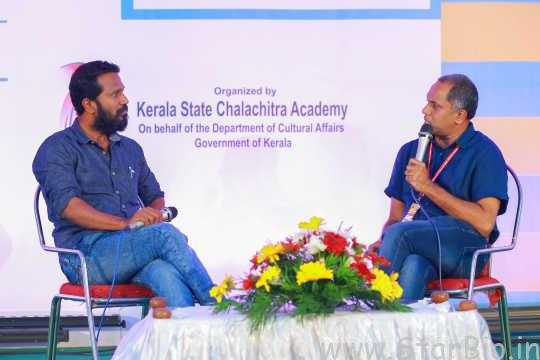Despite the success of Vada Chennai (2018), director Vetrimaaran chose to focus on his more anti-establishment Visaranai (2016) during his conversation at the 23rd International Film Festival of Kerala (IFFK) in Trivandrum.
The director is also a member of the jury for the Indian films category, and was speaking with H Shaji, deputy director of the festival, at the Tagore auditorium.
While the conversation began with the director speaking about his early sojourn into cinema and works in commercial films like Polladhavan (2007) and Aadukalam (2011), Vetrimaaran soon shed light on the need for cinema to become a ‘useful tool’ for social and political change.
“The whole of India has started making political statements and political films because that is the need of the hour,” the director said. “Secularism has to be saved, and when everybody is feeling insecure, they start voicing out louder.”
Emphasizing that in South India, cinema had always been used as a ‘tool of political liberation,’ Vetrimaaran said, “The majority is insecure and so are the minorities, no one feels secure about their place in the country. Cinema has been a tool of political proclamation and liberation.”
Praising Kaala (2018) director Pa Ranjith as a ‘man with a vision’, he said, “Ranjith is a strong political thinker who makes films. Mari Selvaraj [director of Pariyerum Perumal (2018)] is simply an extension of Ranjith. But he is a more accomplished filmmaker.”
Explaining how cinema functions as a tool of social and political change, the director pointed to the works of the late MG Ramachandran and Jayalalithaa, as well as NT Rama Rao, who used cinema as a medium to ‘represent’ the people.
“Cinema speaks to the masses,” Vetrimaaran said. “Unlike poetry or even oration, it gives a feeling to the people that they are represented. I can easily identify with the marginalized. I’ve been there, lived that life, know the thoughts, and know how to get out of it. There are always grey shades in people; there is no good-good person or bad-bad person. Through my films I’ve tried to critique the system which can create someone, and can crush the same person if and when it wants.”
A fan of Japanese filmmaker Akira Kurosawa from his days as an amateur filmmaker, Vetrimaaran even criticized his idol. “I might be wrong in saying this,” he said, “but when I look back, I feel Kurosawa was a bit classist. In all his films, there is no poor farmer or villager who takes up arms or is brave. They always need the samurai.” He mused, “Maybe if Kurosawa were Indian, we would see him make films that tend to an upper-class milieu.”
However, Vetrimaaran agreed that change is coming. He emphasized that it is only possible in films that depict the ‘strength of the collective’. He said, “In popular cinema, you often see one person who brings an end to all issues. There, the filmmakers are actually working against the very cause they started making the film with. When you say there is this one protagonist who changes the world overnight, you end up searching for this hero. The biggest flaw of blockbuster films is that they thus provide a means of escapism for the viewer from all the social pressure that they are under. Films should convey that if you want to bring a change, you can do it.”

